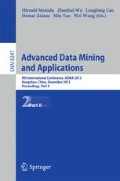Abstract
Expert finding is the process of identifying experts given a particular topic. In this paper, we propose a method called Learning to Rank for Expert Finding (LREF) attempting to leverage learning to rank to improve the estimation for expert finding. Learning to rank is an established means of predicting ranking and has recently demonstrated high promise in information retrieval. LREF first defines representations for both topics and experts, and then collects the existing popular language models and basic document features to form feature vectors for learning purpose from the representations. Finally, LRER adopts RankSVM, a pair wise learning to rank algorithm, to generate the lists of experts for topics. Extensive experiments in comparison with the language models (profile based model and document based model), which are state-of-the-art expert finding methods, show that LREF enhances expert finding accuracy.
Access this chapter
Tax calculation will be finalised at checkout
Purchases are for personal use only
Preview
Unable to display preview. Download preview PDF.
References
Zellhofer, D.: A permeable expert search strategy approach to multimodal retrieval. In: Proceedings of the 4th Information Interaction in Context Symposium, pp. 62–71. ACM (2012)
Mai, X., Ding, G., Wang, J.: Autority aware expert search: Algorithm and system for NSFC. In: Automatic Control and Artificial Intelligence, pp. 585–588. IET (2012)
Guy, I., Avraham, U., Carmel, D., Ur, S., Jacovi, M., Ronen, I.: Mining expertise and interests from social media. In: Proceedings of the 22nd International Conference on World Wide Web, pp. 515–526 (2013)
Davoodi, E., Kianmehr, K., Afsharchi, M.: A semantic social network-based expert recommender system. Applied Intelligence, 1–13 (2013)
Kardan, A., Omidvar, A., Farahmandnia, F.: Expert finding on social network with link analysis approach. In: Electrical Engineering (ICEE), pp. 1–6. IEEE (2011)
Yimam-Seid, D., Kobsa, A.: Expert-finding systems for organizations: Problem and domain analysis and the DEMOIR approach. Journal of Organizational Computing and Electronic Commerce 13(1), 1–24 (2003)
Yimam, D.: Expert finding systems for organizations: Domain analysis and the demoir approach. Beyond Knowledge Management: Sharing Expertise (2000)
Zhu, J., Huang, X., Song, D., Rüger, S.: Integrating multiple document features in language models for expert finding. Knowledge and Information Systems 23(1), 29–54 (2010)
Fang, H., Zhai, C.: Probabilistic models for expert finding. In: Amati, G., Carpineto, C., Romano, G. (eds.) ECiR 2007. LNCS, vol. 4425, pp. 418–430. Springer, Heidelberg (2007)
Craswell, N., de Vries, A.P., Soboroff, I.: Overview of the TREC 2005 Enterprise Track. In: Trec, vol. 5, p. 199 (2005)
Balog, K., Azzopardi, L., De Rijke, M.: Formal models for expert finding in enterprise corpora. In: Proceedings of the 29th Annual International ACM SIGIR Conference on Research and Development in Information Retrieval, pp. 43–50. ACM (2006)
Fang, H., Zhou, L., Zhai, C.: Language Models for Expert Finding–UIUC TREC 2006 Enterprise Track Experiments. In: TREC (2006)
Cao, Y., Liu, J., Bao, S., Li, H.: Research on Expert Search at Enterprise Track of TREC 2005. In: TREC (2005)
Lafferty, J., Zhai, C.: Probabilistic relevance models based on document and query generation. In: Language Modeling for Information Retrieval, pp. 1–10. Springer Netherlands (2003)
Macdonald, C., Ounis, I.: Using relevance feedback in expert search. In: Amati, G., Carpineto, C., Romano, G. (eds.) ECiR 2007. LNCS, vol. 4425, pp. 431–443. Springer, Heidelberg (2007)
Macdonald, C., Ounis, I.: Voting for candidates: adapting data fusion techniques for an expert search task. In: Proceedings of the 15th ACM International Conference on Information and Knowledge Management, pp. 387–396. ACM (2006)
Voorhees, E.M., Harman, D. (eds.): Overview of the Fifth Text REtrieval Conference (TREC1-9). NIST Special Publications (2001), http://trec.nist.gov/pubs.html
Manning, C.D., Raghavan, P., Schütze, H.: Introduction to information retrieval, vol. 1. Cambridge University Press, Cambridge (2008)
Büttcher, S., Charles, C., Gordon, V.C.: Information retrieval: Implementing and evaluating search engines. The MIT Press (2010)
Voorhees, E., Harman, D.K.: TREC: Experiment and evaluation in information retrieval, vol. 63. MIT Press, Cambridge (2005)
Liu, T.Y.: Learning to rank for information retrieval. Foundations and Trends in Information Retrieval 3(3), 225–331 (2009)
Joachims, T.: Optimizing search engines using clickthrough data. In: Proceedings of the Eighth ACM SIGKDD International Conference on Knowledge Discovery and Data Mining, pp. 133–142. ACM (2002)
Author information
Authors and Affiliations
Editor information
Editors and Affiliations
Rights and permissions
Copyright information
© 2013 Springer-Verlag Berlin Heidelberg
About this paper
Cite this paper
Zheng, HT., Li, Q., Jiang, Y., Xia, ST., Zhang, L. (2013). Exploiting Multiple Features for Learning to Rank in Expert Finding. In: Motoda, H., Wu, Z., Cao, L., Zaiane, O., Yao, M., Wang, W. (eds) Advanced Data Mining and Applications. ADMA 2013. Lecture Notes in Computer Science(), vol 8347. Springer, Berlin, Heidelberg. https://doi.org/10.1007/978-3-642-53917-6_20
Download citation
DOI: https://doi.org/10.1007/978-3-642-53917-6_20
Publisher Name: Springer, Berlin, Heidelberg
Print ISBN: 978-3-642-53916-9
Online ISBN: 978-3-642-53917-6
eBook Packages: Computer ScienceComputer Science (R0)

